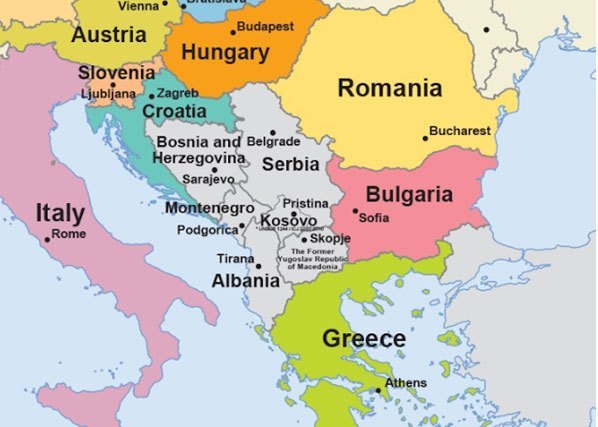Greece Joins China & Central Eastern Europe Cooperation Forum
Greece has joined the Beijing backed Co-operation Between China and Central and Eastern Europe Countries (CEEC). Previously also referred to as the 16+1 the forum includes China in addition to Albania, Bosnia and Herzegovenia, Bulgaria, Croatia, Czech Republic, Estonia, Greece, Hungary, Latvia, Lithuania, North Macedonia, Montenegro, Poland, Romania, Serbia, Slovakia, and Slovenia. Greece’s membership was passed at the recent CEEC meeting held in Dubrovnik.

As can be seen, the CEEC countries effectively run from north to south Europe. Greece’s addition extends that reach well into the Mediterranean and Aegean Seas.
The CEEC, or 17+1 as it is now, has proved controversial as it includes several EU member states. Brussels views the CEEC as loosening its overall authority and is concerned about Chinese overtures to members in its own political and trade sphere. However, several members are also critical of the EU, stating that interference most notably in much-needed financial investment by China into cross border EU projects between EU members and non-EU states to the east and south Europe has caused unnecessary infrastructure improvement delays. Greece meanwhile is heavily indebted to the EU, and like Italy, is looking at alternatives to EU funding to enable it to continue with much-needed infrastructure developments. The Greek Port of Piraeus is a major gateway to the EU along the Belt & Road Initiative and is now mostly owned by China Shipping Company (COSCO), who acquired a 67% stake in 2017. China plans to build a second terminal to enhance the capacity for shipping goods to Europe. Greece was one of the fist European nations to sign up to China’s Belt & Road Initiative back in 2017.
The CEEC now covers a large area of Europe with its members agreeing to cooperate on matters of “providing promising opportunities for both China and Europe, covering infrastructure, transportation and logistics, trade and investment.” The CEEC have also set up a joint CEEC fund to handle such projects.
Chris Devonshire-Ellis of Dezan Shira & Associates comments ‘Greece’s addition to the CEEC is no great surprise and provides China will a long north-south corridor in primarily Eastern European countries to allow it to gain traction in terms of both provision of infrastructure development and upgrades as well as bilateral trade. It will be interesting to note in the following three years how this impacts on commitments to build and finance infrastructure in the region, much of which is still hampered by ex-Soviet development issues and are in desperate need of upgrades. Issues to watch for are the potential for conflict between Beijing and Brussels, and for Governments in these countries to take appropriate due diligence advise when dealing with loans and contracts with Chinese SOE’s. Professional advice should be sought from the private sector.’
About Us
Silk Road Briefing is produced by Dezan Shira & Associates. Chris Devonshire-Ellis is the practice Chairman. The firm has 26 years of China operations with offices throughout China, Asia and Europe. Please refer to our Belt & Road desk or visit our website at www.dezshira.com for further information.
 Related Reading:
Related Reading:
![]() EU Investment Tender Compliance Regulations Hinder China at Budapest CEEC Gathering
EU Investment Tender Compliance Regulations Hinder China at Budapest CEEC Gathering
![]() Will Italy be Overrun by Chinese Workers? EU Minimum Wages Compared with China’s Belt and Road Contractors
Will Italy be Overrun by Chinese Workers? EU Minimum Wages Compared with China’s Belt and Road Contractors
![]() EU Position Paper on Europe – Asia Connectivity Doesn’t Mention China’s Belt and Road Initiative
EU Position Paper on Europe – Asia Connectivity Doesn’t Mention China’s Belt and Road Initiative





